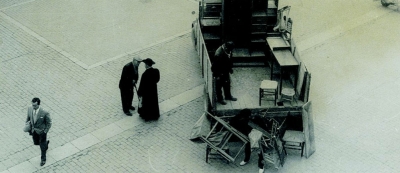
BRIEF HISTORY
Shortly after the end of the Civil War, in the autumn of 1939, Manuel de Falla departed from Granada bound for Argentina. His belongings remained in his house in the Antequeruela Alta, for Don Manuel took with him only his thoughts – and not least his memories of Granada. Under the guardianship of his friends, this legacy was kept in convents and other people’s homes until, on Falla’s death in 1946, his brother Germán began to collect the composer’s documents together in Cádiz, along with those brought back from Argentina by his sister María del Carmen. In 1961, through contact with the then Mayor of Granada, Manuel Sola, the remainder of the books and documents were brought together and transferred to Madrid.
In 1962, the architect José María García de Paredes and the music critic Enrique Franco made a first attempt at putting the collection in order, in preparation for an exhibition of the composer’s most representative belongings and documents at the Monasterio de San Jerónimo. This marked the establishment in Madrid, under the supervision of Isabel de Falla, of what was to become the basis of the present archive, and steps began to be taken to arrange for its definitive installation in Granada.
In 1965, Manuel de Falla’s house in Granada was opened as a museum. This was followed in 1978 by the inauguration of the Centro Cultural Manuel de Falla, already marked out as the archive’s eventual location. The plan for the archive’s transfer from Madrid was given a boost by the municipal authorities in Granada, headed by the Mayor, Antonio Jara, and the Culture Councillor, José Miguel Castillo, who actively supported the project. In 1988, a decisive step was taken with the creation of the Fundación Archivo Manuel de Falla, which agreed to place its entire documentary collection on deposit in the city. This important agreement between the Fundación and the city council was strengthened by the involvement of the Ministry of Education and Culture, the Department of Culture of the Junta de Andalucía and the University of Granada. In March 1991, the Archivo Manuel de Falla opened in the city that the composer had chosen as his place of residence during his years of maturity.
In 1962, the architect José María García de Paredes and the music critic Enrique Franco made a first attempt at putting the collection in order, in preparation for an exhibition of the composer’s most representative belongings and documents at the Monasterio de San Jerónimo. This marked the establishment in Madrid, under the supervision of Isabel de Falla, of what was to become the basis of the present archive, and steps began to be taken to arrange for its definitive installation in Granada.
In 1965, Manuel de Falla’s house in Granada was opened as a museum. This was followed in 1978 by the inauguration of the Centro Cultural Manuel de Falla, already marked out as the archive’s eventual location. The plan for the archive’s transfer from Madrid was given a boost by the municipal authorities in Granada, headed by the Mayor, Antonio Jara, and the Culture Councillor, José Miguel Castillo, who actively supported the project. In 1988, a decisive step was taken with the creation of the Fundación Archivo Manuel de Falla, which agreed to place its entire documentary collection on deposit in the city. This important agreement between the Fundación and the city council was strengthened by the involvement of the Ministry of Education and Culture, the Department of Culture of the Junta de Andalucía and the University of Granada. In March 1991, the Archivo Manuel de Falla opened in the city that the composer had chosen as his place of residence during his years of maturity.




